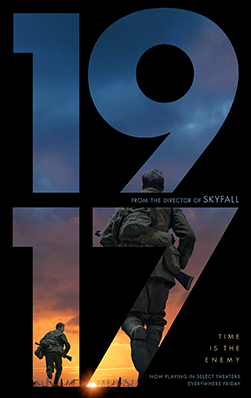‘1917’ sheds light on the past

1917 was directed by Sam Mendes and premiered on December 4th.
January 23, 2020
The phrase “World War I movie” doesn’t generally bring about warm, fuzzy feelings. It reminds students of the horrid memories of watching in-class documentaries and completing graded worksheets based on regurgitating facts from the film. “1917” isn’t one of these movies.
Over a century later, there is not a living person that remembers the “Great War.” In a society filled with memes about our president being in a peach and a World War III “on the rise,” it was refreshing to be reminded of a time when war was a heartfelt, serious matter. Through calculated cinematography and strong acting, “1917” portrays well the trauma and loss of the First World War.
“1917” follows two British corporals, Blake (Dean-Charles Chapman) and Schofield (George Mackay), as they rush to a company a few miles away, attempting to stop a rising attack. Pressed for time, the two must reach their destination before dawn or hundreds of soldiers, including Blake’s older brother, will die. The film is loosely based on a story told by director Sam Mendes’s grandfather.
The film shows an in-depth perspective of trench warfare and the battles that occurred. It captures well the bloodshed and sorrow that the war brought to the world. The historical accuracy of the entire film is stunning, and it is obvious how much attention was put into making the sets as accurate as possible. It really gives the audience the ability to gain a strong perception of what the war was really like.
The cinematography was arguably the most well-planned and intriguing aspect of the movie. The movie was filmed to look as if it were done in one shot, which is exceptionally difficult. This means the directors had to take into account weather conditions, camera angles and film timing with extreme accuracy. The entirety of the movie only follows one day, so the idea worked well with the time setting the directors chose.
While the details were well-executed, I had trouble focusing on the characters and the plot because the camera was moving so much. However, I don’t exactly have 20/20 vision, so it might just be my lack of glasses as opposed to a cinematic mistake. The cinematography as a whole was captivating, but the action of the movie seemed to get lost in the constant camera movement.
Acting in a film like this can prove to be challenging, as it can be difficult to portray the melancholy, yet nationalistic, struggles of war. George Mackay, who played Lance Corporal Schofield, successfully managed to illustrate the complexity of Schofield and the depth of the war. Unlike other movies, in which the audience cannot sympathize with the characters and feel their pains, Mackay is able to portray such an interesting character with realistic, personable emotions and experiences.
Although the majority of the music in “1917” is instrumental, it is pivotal to the plot of the film. The only exception is a ballad sung by a man to his fellow soldiers. Every song adds to the film, as the music dramatizes the intense scenes thoroughly. A few scenes that would have been mediocre were great due to the strong soundtrack.
Although the somewhat blurry cinematography made it difficult to focus, the acting, soundtrack and plot make the film worthwhile. Through well-developed characters and strong dialogue, “1917” was able to successfully portray the suffering of the world’s most gruesome war.









